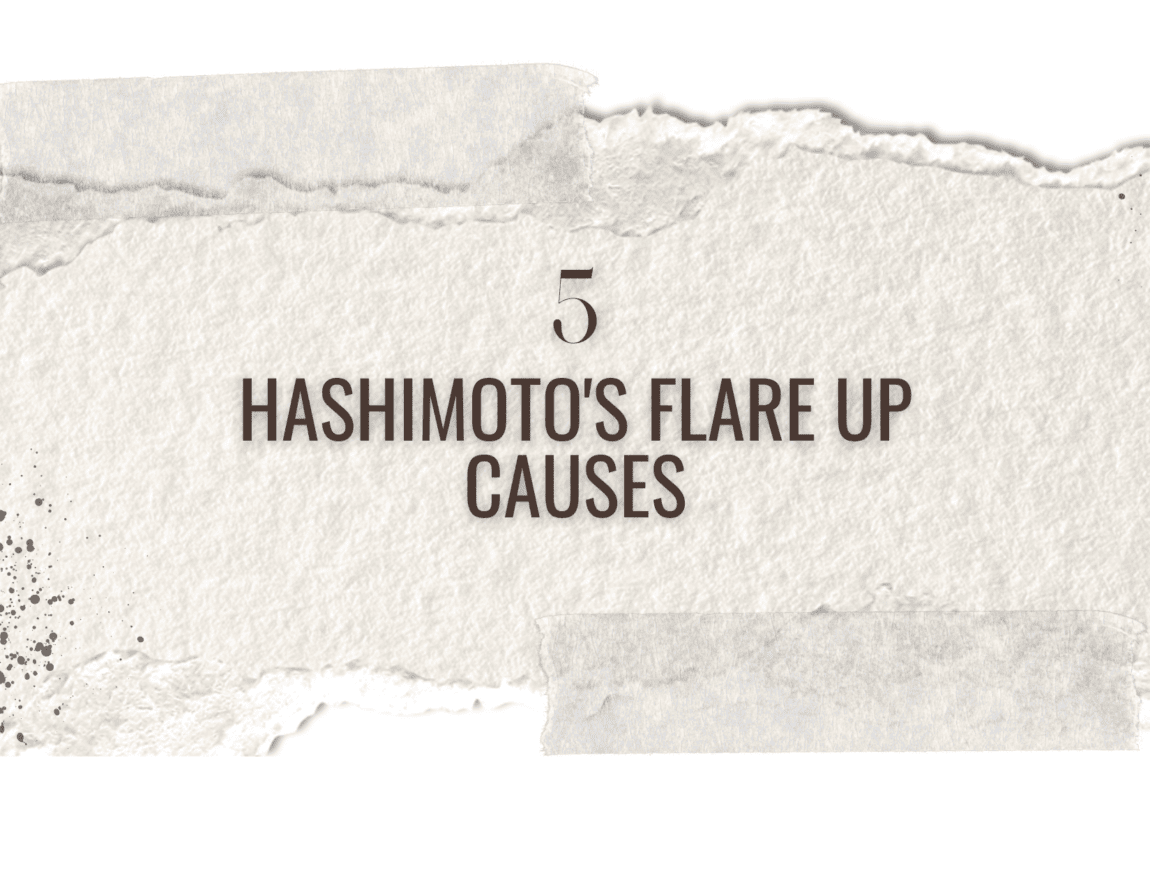
5 Hashimoto’s Flare Up Causes
Hashimoto’s Thyroiditis is an autoimmune thyroid disease that causes your immune system to target and destroy the thyroid’s hormone-producing cells. It’s one of the most common autoimmune diseases in the United States. More than 80 known autoimmune diseases affect about 8% of the world’s population. In the United States alone, that number is close to 50 million people. For unknown reasons, women are disproportionately affected, making up 78% of the people with an autoimmune condition.
If you have Hashimoto’s thyroiditis, then I’m sure at some point you’ve experienced the frustrating and uncomfortable symptoms of a flare-up. That’s because, despite taking medication to manage thyroid hormone levels, hidden triggers can cause your immune system to flare up.
Whether you were recently diagnosed with Hashimoto’s or looking for new ways to manage your symptoms, you can take back a level of control and better manage your health by understanding the unexpected culprits that contribute to a flare-up. This post explores these surprising culprits and provides actionable tips for addressing them.

5 Hashimoto’s Flare Up Causes
If left untreated, Hashimoto’s disease can cause trouble swallowing, depression, reduced mental capacity, and even heart failure. Unfortunately, people with pre-existing autoimmune diseases are more likely to experience this disease and the risk of developing Hashimoto’s increases as you age.
The good news is Hashimoto’s disease is a manageable disease. This means that the symptoms of Hashimoto’s can be lessened or even prevented by reducing flare-ups. Flare-ups are a period of worsened or intensified symptoms caused by an added stressor to an already compromised immune system. When it comes to Hashimoto’s specifically, a flare-up can cause people with this disease to experience symptoms of hyperthyroidism and cause disruptions in their everyday routine.
Despite changing your diet and medication, you may still struggle to manage your symptoms. That’s because there are hidden triggers that you may not have considered.
Several different things can cause Hashimoto’s flare-ups, from environmental triggers to the food we eat. This is why it’s important to know these causes of flare-ups and how to avoid them.
Since being diagnosed with Hashimoto’s Thyroiditis, commonly called Hashimoto’s Disease, I’ve been dedicating serious research time to learning about this disease and how to prevent flare-ups. So, let’s dive right in!
Gluten
Gluten is a protein found in many grains like wheat, rye, and barley. Some common foods that include gluten are pastries, cereal, bread, and processed lunch meats. So think carbs, bread, cakes, pasta, bagels, etc.
Gluten can cause a thyroiditis flare-up because of the effects it has on the small intestine. Eating gluten may cause irritation to the small intestine, which can lead to leaky gut syndrome and/or gut dysbiosis. Leaky gut syndrome allows toxins to escape into the bloodstream and triggers an autoimmune reaction that attacks healthy cells in the thyroid.
You can avoid gluten by following a gluten-free diet. Also, keep in mind that gluten can sometimes be found in alcoholic beverages. Especially beers. So it’s important to check that as well. Here is a list of the Worst Foods For Autoimmune Disease if you want to learn more.
Dietary Inflammation
Dietary inflammation caused by eating unhealthy, greasy, or spicy foods is also a common trigger for Hashimoto’s flare-ups. These foods stress the immune system by causing inflammatory autoimmune reactions within the body, typically near the thyroid gland.
Research has shown that people with Hashimoto’s are more likely to have an imbalanced gut microbiome, with lower levels of beneficial bacteria and higher levels of harmful bacteria. Eating reactive foods like gluten, dairy, fried foods, sugar, and alcohol can lead to diarrhea, bloating, gas, cramping, chronic inflammation, increased gastrointestinal stress, and possible elevation in thyroid antibodies.
The good news is that making dietary changes and incorporating probiotic-rich foods such as sauerkraut, kimchi, and kefir or taking a high-quality probiotic supplement can help replenish beneficial bacteria in the gut.
So to avoid flare-ups caused by dietary inflammation, be sure to avoid any reactive foods that you know cause stomach pain, diarrhea, etc. To reduce inflammation, follow an anti-inflammatory diet favoring gluten free whole grains, fruits, and vegetables. You can also work with a registered dietician to create a meal plan to help you avoid nutrient deficiencies while learning to avoid these reactive foods.
Chronic Stress
Chronic stress can greatly affect your thyroid function. As the body sustains chronic stress, it causes the adrenal glands to produce more cortisol, which is a thyroid-triggering hormone. This means that the more stress we sustain, the more cortisol we produce, and the more we unduly trigger the thyroid. Then this can cause hyperthyroidism and have many negative effects on the body. These negative effects include weight gain, headaches, tiredness, and soreness. So the best way to avoid chronic stress is to manage the stress. Click here to read 27 Simple Self-Care Hacks That Are Easy and Free.

How To Calm A Hashimoto’s Flare Up
In addition to nutrition and stress management, incorporating mindfulness meditation, yoga, or deep breathing exercises can be helpful in reducing stress and supporting our adrenal health. Getting adequate sleep is also crucial, as sleep deprivation can disrupt our hormonal balance and immune function.
Lastly, incorporating other holistic approaches such as acupuncture, massage, and chiropractic care into our treatment plan can help improve circulation, reduce inflammation, and promote overall well-being.
By addressing these factors, we can take a holistic approach to manage Hashimoto’s and reduce the risk of flare-ups.
There are many ways to accomplish this. You might:
- Get a good night’s sleep
- Eat healthy, nutrient-dense food
- Remove stressful situations and people from your life
- Meditate for stress-relief
- Research stress-management techniques
- Start a stress-relieving workout routine
- Visit a doctor or therapist about stress-management
Viral Infections
Viral infections are a common environmental trigger of a Hashimoto’s flare-up. They can cause inflammation throughout the body, triggering an autoimmune response to start attacking healthy cells.
The effects of a viral infection-triggered flare-up are more intense and longer-lasting infections, skin rashes, dry skin, brittle hair, and other similar symptoms. So it’s important to try and avoid being exposed to viral pathogens as best you can.
Some effective ways to avoid viruses are to:
- Wash your hands thoroughly and regularly
- Wash your hands before and after eating
- Clean frequently touched surfaces on a regular basis
- Eat a nutritious diet
- Get plenty of sleep
- Avoid touching your face
- Checking in with close contacts to see if they are also taking precautionary steps to stay healthy and keep you healthy.
Certain Nutrients & Minerals
When taking thyroid medication to manage your Hashimoto’s symptoms, certain vitamins and minerals can interfere with the effectiveness of your medication. Interference in your medication can trigger a flare-up by causing thyroid autoimmunity and an imbalance in your thyroid hormone levels. Common nutrients and minerals that can inference with thyroid functioning are calcium, iron, multivitamins containing iron, and antacids containing magnesium or aluminum. So check the labels on your vitamins!
You can avoid this type of interference by always taking your medication on an empty stomach as soon as you wake up in the morning. And then, wait at least 2-3 hours before consuming any additional calcium, iron, or antacid supplements. Allowing the medication time to kick in before consuming these nutrients and minerals will prevent overlap and interference.
Natural Supplements For Hashimoto’s Thyroiditis
Studies show that people with Hashimoto’s disease often have vitamin and nutrient deficiencies. What’s still unknown is if deficiencies caused the disease or if the disease causes nutrient deficiencies. While supplements may be beneficial for some patients with Hashimoto’s, some marketed to promote thyroid health can be dangerous. Therefore, you should always check with your certified health professional before starting new supplements.
- Selenium
- Zinc
- Iron
- Curcumin
- Magnesium
Symptoms of Hashimoto’s Flare-Ups
- Fatigue
- Insomnia
- Muscle & joint aches or pain
- Inflammation or puffy face
- Constipation
- Unexplained weight gain
- Pale complexion
- Dry skin
- Swollen or enlarged thyroid
- Cold sensitivity
- Dry hair or hair loss
- Brittle nails
- Muscle weakness
- Slower heart rate
- Trouble with memory
- Increased mood swings, anxiety, or depression
- Irregular or heavy menstrual periods
Taking steps to prevent Hashimoto’s Disease flare-ups isn’t a guarantee, but they do help!
There are many causes of Hashimoto’s flare-ups, which is why it’s important to be aware of possible triggers. By avoiding common triggers, you can help keep your symptoms at bay and also maintain a high quality of life. When it comes to Hashimoto’s, you can make plenty of life changes to ensure you’re taking good care of yourself. For example, I’ve had to make huge changes to my workout routine, leading me to write about the do’s and don’ts of exercising with Hashimoto’s Disease.
So, to wrap it up, I’ll leave you guys with two last pieces of advice. If you do start experiencing any symptoms of a Hashimoto’s flare-up, it’s really important to record your symptoms. Then try to figure out what caused them and track their severity. This will help you so much when learning what to avoid in the future. And finally, if you’re experiencing any common symptoms of autoimmune diseases at all, be sure to monitor your symptoms and reach out to a doctor as soon as possible. So I hope you guys found this information helpful, and I’ll talk to you guys soon!
Xx Monti

